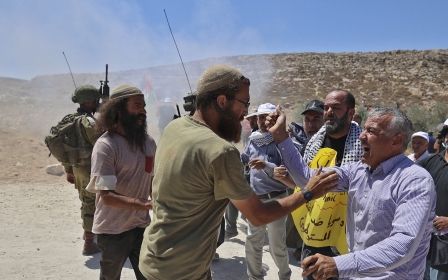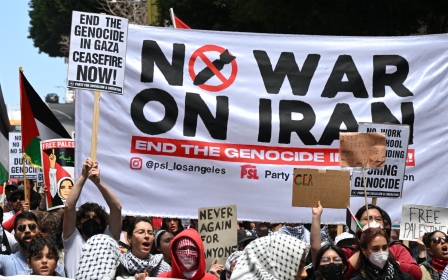'Deluge' sweeps away western myths about Gaza, Hamas and Israel in essential collection

Deluge: Gaza and Israel from Crisis to Cataclysm, edited by Jamie Stern-Weiner, is an invaluable book, for experts and novices alike. That it should be so is in part testimony to the abject quality of western media coverage of this subject.
The 13 authors featured here - ranging from celebrated academics such as Avi Shlaim, professor emeritus at Oxford University, to independent contributors such as “RJ”, a “researcher and humanist living in the United States” - are all firm supporters of the Palestinian cause.
But none of the chapters is a polemic. Rather, for the most part, the book constitutes a simple statement of bald facts of which many western readers will be shamefully ignorant.
Chapters by Shlaim and fellow academics Colter Louwerse and Khaled al-Hroub map the history of Gaza and Hamas. That of Hamas is inextricably bound up with the failure of its secular predecessor at the forefront of the Palestinian struggle, Yasser Arafat’s Fatah, which dominated the Palestine Liberation Organisation (PLO).
Arafat renounced violence in 1988 and recognised the state of Israel in 1993 as part of the Oslo Peace Accords. In return he received nothing. The Israelis accelerated the construction of illegal settlements on the West Bank and it now appears quite possible Arafat himself was murdered.
Stay informed with MEE's newsletters
Sign up to get the latest alerts, insights and analysis, starting with Turkey Unpacked
Today, the Palestinian Authority created by the Oslo Accords, which still controls the West Bank, is widely despised by Palestinians as corrupt and complicit, little more than a gaoler of its own people.
Hamas, which rose to prominence as a result of a spate of suicide bombings in the 1990s, was its rejectionist antithesis.
But from 2005, in the wake of the failure of the Second Intifada, it too embarked tentatively on the path of compromise. It renounced suicide bombings and agreed to participate in elections.
Thereafter, Hamas’s history is one of catastrophic success, a series of entirely unexpected triumphs, which nevertheless left it no closer to achieving its goals.
Justifying the slaughter
Two facts are repeated ad nauseam in western media and serve above all others to justify the slaughter in the Gaza Strip. Neither is ever challenged and both are untrue.
The first is that Hamas coerces the civilian population into acting as human shields. As Talal Hangari, a London-based writer, points out in his chapter on the Palestinian solidarity movement in the UK, human rights investigators rejected this.
On the contrary, they found strong evidence it’s a practice regularly employed by the Israelis.
The second is that Hamas is firmly and irrevocably committed to the destruction of Israel, leaving the Israelis with no space for compromise. In fact, since 2005, as Hroub argues, Hamas has repeatedly signalled its readiness to accept a Palestinian state based on the 1967 borders, at least on a temporary basis.
Hamas’s position was formalised in its 2017 Document of General Principles and Policies, which described a Palestinian state “along the lines of the 4th June 1967” as “a formula of national consensus”. That it withholds the ultimate bargaining chip of formal recognition of Israel is understandable given the earlier experience of Fatah.
Israel and its allies may be wary of Hamas’s sincerity. But, as Louwerse points out: “At no point in the last 15 years have Israel or the United States ever so much as seriously considered testing Hamas’s offers to negotiate a peaceful end to the conflict."
Against all expectations, Hamas won the 2006 elections in Gaza and the West Bank and formed a government of national unity.
Forewarned of a US-backed coup by Fatah, in June 2007 it moved pre-emptively against its opponents in the Gaza Strip. The unexpected collapse of the forces of the Palestinian Authority encouraged it to take total control.
'Death their only deliverance'
Like Fatah before it, Hamas suddenly found itself confronted with the challenge of combining governance with resistance.
The Israelis immediately imposed a blockade. A powerful chapter on the “econicide” of Gaza by Harvard academic Sara Roy lays out in detail the Israeli policy of what she calls “de-development”.
“As part of their overall embargo plan against Gaza, Israeli officials have confirmed (to US embassy economic officers) on multiple occasions that they intend to keep the Gazan economy on the brink of collapse without quite pushing it over the edge,” a US embassy cable, released by WikiLeaks, stated in November 2008.
Louwerse argues convincingly that, rather than being the product of Palestinian intransigence, Israeli violence has frequently been aimed at thwarting any possibility of negotiation and compromise.
“Israeli actions in Lebanon,” a US embassy cable noted as far back as 1979, “are designed to weaken the position of moderate Palestinians and drive them into extremist attitudes which will effectively prevent the US from doing business with them.”
Determined to avoid the fate of Fatah and to become a simple sub-contractor for the Israeli occupation, 'on 7 October, Hamas rolled the dice', Hloub writes
This pattern has continued. Shlaim, Louwerse and Hloub all present compelling evidence that Hamas has frequently shown greater readiness to compromise and to abide by ceasefires than the Israelis.
A chapter by “RJ” examines the Great March of Return in 2018 and 2019, when Palestinians in the Gaza Strip demonstrated peacefully in their thousands for the right to return to their lands in Israel, only to be mown down by Israeli snipers crouching behind sand berms several hundred metres away. More than 200 were killed.
With the election of a far-right government in Israel in 2022, Hamas appeared to have reached an impasse. “One million children were fated to rot in the Gaza prison camp, with death their only deliverance,” writes Hloub.
Determined to avoid the fate of Fatah and to become a simple sub-contractor for the Israeli occupation, “on 7 October, Hamas rolled the dice”, Hloub writes.
Grim reality
Its astonishing success in penetrating the barrier and over-running Israeli military bases was its final and most unexpected triumph.
None of the contributors to Deluge seeks to justify the slaughter of civilians that followed. But Ahmad Alnaouq’s chapter on the death of 21 members of his extended family in a single bombing - the most personal in the book - is a powerful indictment of the savagery of the Israeli response.
If Hamas “had a plan for following up on their success with anything more substantial than hostage negotiations, this was kept even more secret than the initial attack”, writes American academic Nathan J Brown in his chapter, "Into the Abyss". “Tactics seemed to be connected to a prayer rather than a strategy or plan.”
Equally, he says, Israel’s brutal destruction of the Gaza Strip seems to entail no plan at all for the day after.
Today, as on 6 October, Palestinians confront the grim reality of an implacable enemy, incomparably more powerful than themselves, and a western political establishment that appears indifferent to their fate.
Chapters by Mitchell Plitnick, a former co-director of Jewish Voice for Peace, and Hangari paint a dispiriting picture of how allegations of antisemitism continue to be wielded to demonise and delegitimise the Palestinian solidarity movement in the US and the UK.
“The contest of Palestinian rights in the United States [has] been largely relegated to a battle over the very legitimacy of support for those rights,” writes Plitnick. White House Press Secretary Karine Jean-Pierre described the small handful of members of Congress calling for a ceasefire as “repugnant” and “disgraceful”.
“There are not two sides here,” she said.
Clare Daly, an Irish MEP, offers a penetrating portrait of how Ursula von der Leyen, the unelected president of the European Commission, effectively hijacked the EU response to 7 October, offering Israel “unequivocal” support when the EU constitution gave her no right to do so.
“A long twilight of disintegration and despair lies ahead,” writes Nathan J Brown.
It’s hard not to share his pessimism.
The views expressed in this article belong to the author and do not necessarily reflect the editorial policy of Middle East Eye.
Middle East Eye delivers independent and unrivalled coverage and analysis of the Middle East, North Africa and beyond. To learn more about republishing this content and the associated fees, please fill out this form. More about MEE can be found here.






